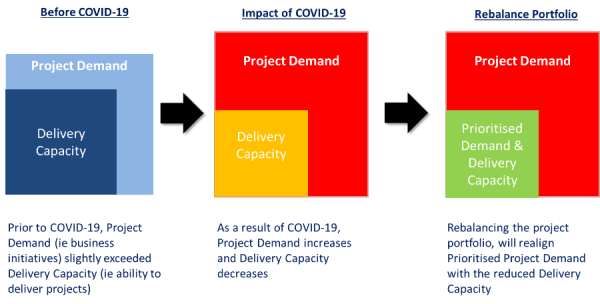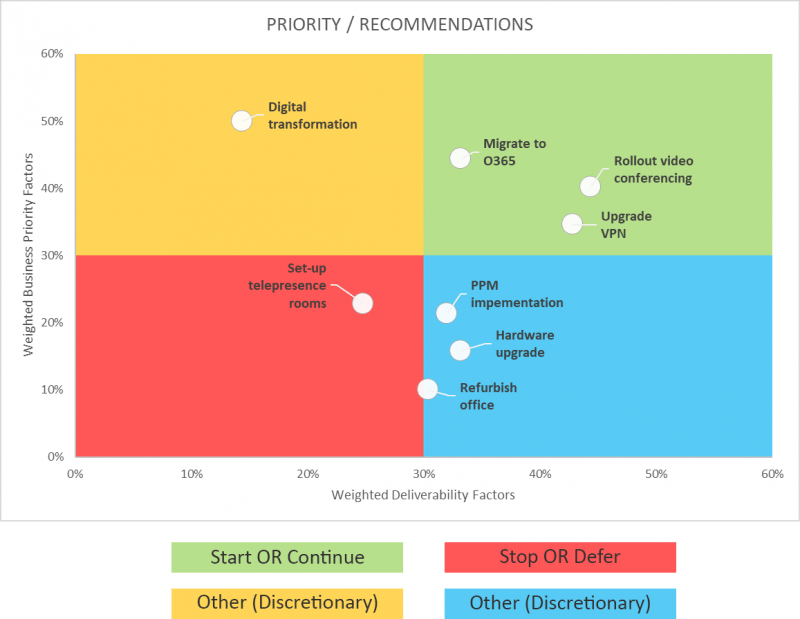
The COVID-19 Coronavirus pandemic has introduced a range of new challenges for businesses to contend with both domestically and globally. These impacts and challenges put at risk traditional business models from both strategic and operational perspectives.
As the macro environment changes overnight, health, regulation and economic impacts are potentially invalidating current business strategies, requiring organisations to reconsider their portfolios of current and proposed work.
Organisations should not make rushed decisions and should assess the impact of COVID-19 and the economic outlook on their organisation’s appetite for investment and the most important areas for this investment to be applied. Organisations should review current projects and improvement initiatives to ensure alignment with the revised investment priorities. Organisations should conduct this review in a measured and structured way to ensure the best decisions are made.
The COVID-19 crisis has created demand for urgent new projects and has impacted the economic outlook for organisations, in some cases in a positive way, but in many cases for the negative. COVID-19 has also had an impact on most organisation’s capacity to deliver projects, including the ability of offshore operations to continue to deliver the same levels of productivity. Working from home may not be an option or sub-optimal in these areas which will force organisations to recut their planned spend and resourcing.
A conventional approach is to review the organisation’s project portfolio is to categorise each project according to one of the following categories: start, stop, continue, defer or merge. However, before you can recategorize the projects, an updated view of the organisation’s business priorities and capacity needs to be determined.
A high-level overview of an organisation’s project demand vs capacity is illustrated below:

Prior to COVID-19, an organisation’s project demand is likely to slightly exceed its delivery capacity. However, once the COVID-19 crisis arrived, the organisation’s project demand initially increases as new initiatives are required to respond to the COVID-19 crisis (e.g. remote working, video conferencing, VPN upgrades etc). The delivery capacity of the organisation is also likely to have reduced due to organisational efficiency measures eg. reduce exposure to ‘contractors’, lower staff availability, lower productivity and offshore impacts. The gap between project demand and delivery capacity has widened and is not sustainable. The organisation needs to realign its prioritised project demand with its reduced capacity to delivery.
Seven Consulting has developed a portfolio planning tool which can be used to rank projects according to their ‘business priority’ and ‘deliverability’ as well as considering the ‘capacity’ to deliver :
Business priority can be represented by factors such as the type of project, contractual obligations and business benefits that the project is expected to generate.
- An organisation’s business priorities are likely to have changed as a result of COVID-19, the government restrictions and the economic outlook. The highest priority is likely to be allocated to projects which are government mandated, critical responses to COVID-19, contractual obligations, enabling customer self-service or supporting new business models that have emerged since the COVID-19 crisis started.
Deliverability can be assessed by looking at a combination of execution risk and benefits realisation risk.
Key factors to consider in determining an organisation’s revised capacity can include:
- Funding – how much funding will be allocated to discretionary projects as a result of the poor economic outlook and government restrictions?
- People – how many people are still available for work? How many are sick or caring for others? How many resources have had to be redeployed to urgent BAU activities?
- Productivity – how productive is the workforce when many of them are working from home? How good are the organisation’s collaboration tools to support remote working?
- Offshore – what is the organisation’s exposure to offshore work? how productive are the organisations offshore team during lockdown restrictions in certain countries such as India and the Philippines?
A sample project prioritisation diagram created from Seven Consulting’s Portfolio Planning tool is illustrated below. The diagram provides management with a visual representation of the relative business priority and deliverability of projects within the portfolio :

In this example, projects such as migrating to Office365, rolling out Zoom video-conferencing and upgrading the VPN (Virtual Private Network) are likely to be started or accelerated in the current environment. While projects such as refurbishing the office or upgrading the cafeteria are much less likely to be approved in the current environment.
The Seven Consulting’s approach to assessment of an organisations portfolio, leveraging our Portfolio Planning Tool, will enable an organisation to discuss and decide which projects should continue and which projects need to be stopped or deferred.
In conclusion, reviewing an organisation’s project portfolio in the current environment should recognise changed business priorities with generally a lower capacity to delivery projects and the subsequent need for some projects to be stopped, started or accelerated.
Seven Consulting’s approach to Portfolio Assessment, leveraging their Portfolio Planning Tool, enables organisations to make portfolio decisions in a structured manner and ensure its money is being spent “on the right stuff”.

About Alex Massie
Alex Massie is an experienced Program Director who joined Seven Consulting’s Melbourne team in 2014. He has worked extensively on delivering large, complex programs of work, with multiple vendors and solutions. He has 10 years’ telecommunications industry experience (across both enterprise and consumer segments) and 15 years financial services experience (spanning retail banking and superannuation). Prior to Seven Consulting, Alex held executive management positions at IBM, Accenture, and Deloitte. He has extensive experience in mergers & acquisitions, digital transformations, and business transformations. He completed the Company Directors course from AICD in late 2022.



